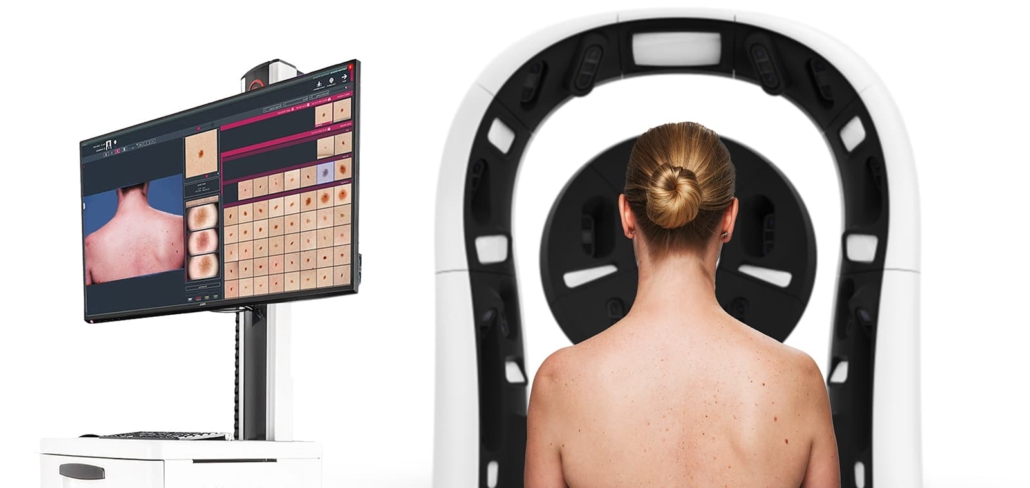AI-enhanced full body scanner advances melanoma detection
An EU-funded project has developed an intelligent full-body scanner that employs explainable AI to improve early detection of melanoma, potentially transforming dermatological diagnostics and patient outcomes.

Skin cancer prevention using the full body scanner within the iToBoS-Project © Edit / Fraunhofer HHI
The early detection of melanoma significantly improves prognosis, yet traditional diagnostic methods remain time-consuming and subject to human error. A consortium of 20 partners has developed an innovative solution through the EU-funded Intelligent Total Body Scanner for Early Detection of Melanoma (iToBoS) project, incorporating explainable artificial intelligence (XAI) to enhance diagnostic accuracy and efficiency.
Technology integration
The full-body scanner, developed by Bosch, completes comprehensive skin examinations in just six minutes, representing a substantial improvement over conventional dermatological assessments. The system utilises high-resolution cameras with liquid lenses that mimic the structure of the human eye, producing exceptionally detailed images for analysis.
Central to the system’s capabilities is the integration of patient data – including demographics, UV damage history, and risk factors – with the scan results to provide a personalised risk assessment for each identified skin lesion. This holistic approach enables a more nuanced and comprehensive analysis than traditional isolated examinations of pigmented lesions.
Addressing algorithmic transparency
In medical diagnostics, the reliability and verifiability of AI decision-making processes are paramount concerns. Researchers from the Fraunhofer Institute for Telecommunications, Heinrich-Hertz-Institut (HHI) have incorporated several XAI methods to address the traditional ‘black box’ limitation of AI systems.
“In the past, AI systems were treated as black boxes. The systems were trusted to do the right things, but unfortunately, that isn’t always the case. With our XAI methods, we’ve succeeded in rendering the solution-finding process of AI systems transparent and overcoming that black box aspect,” explains Professor Wojciech Samek, head of the Artificial Intelligence department at Fraunhofer HHI.
These methods include the patented Layer-Wise Relevance Propagation (LRP), Concept Relevance Propagation (CRP), and Prototypical Concept-Based Explanations (PCX), which allow the team to visualise and interpret the neural networks’ decision-making processes.
“Thanks to our explainable AI methods, we don’t just identify anomalous moles but actually explain at the same time what makes them different. We’re using LRP and CRP to visualise and interpret neural networks and other machine learning models and measure the influence of every input variable in the overall prediction,” adds Dr Sebastian Lapuschkin, head of the Explainable Artificial Intelligence research group.
Clinical implications
The iToBoS system offers several potential benefits for clinical practice. By automating the preliminary assessment process, it may reduce the burden on healthcare professionals while potentially lowering the number of unnecessary biopsies. The ability to perform repeated scans over time facilitates more effective monitoring of changes in pigmented lesions, enhancing the capacity for longitudinal assessment.
The researchers have also developed a ‘Reveal to Revise’ (R2R) method to further refine the AI system by identifying and correcting anomalous or erroneous behaviours, ultimately improving the robustness and reliability of the diagnostic platform.
Future directions
While currently focused on melanoma detection, the technology could potentially be adapted to identify other skin conditions such as neurodermatitis. The project’s data collection efforts in Queensland, Australia, and Barcelona aim to expand the system’s applicability to diverse global populations.
The EU has provided €12.1 million in funding for this project, which represents a significant investment in advancing dermatological diagnostics through AI integration.
Reference:
Fraunhofer Institute for Telecommunications, Heinrich-Hertz-Institut, HHI. (2025, March 3). AI Diagnostic Platform Improves Early Detection of Skin Cancer. Research News. https://www.fraunhofer.de/en/press/research-news/2025/march/ai-diagnostic-platform-improves-early-detection-of-skin-cancer.html

